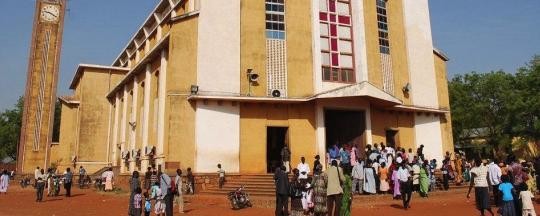South Sudan’s government will not allow the Catholic Church to operate a radio station in the national capital unless it censors its programmes and clarifies its role, according to media officials in Juba.
Bakhita FM is part of a network of radio stations that the Catholic Church began operating in South Sudan after the Islamist NCP party lost power in 2005 to SPLM, a secularist party with Marxist origins.
The station has been off-air already for five days after security agents raided its premises, seized the key to the building and detained a news editor for four days.
Described as ‘the voice of the church,’ the station had been reporting on the ongoing conflict in the country as well as the peace talks in Addis Ababa, where a delegation of South Sudanese church leaders are calling for a negotiated settlement to the current conflict.
South Sudan’s government, which is boycotting the talks, has made clear that it aims to control reporting on the peace talks and on the conflict itself by banning interviews with opposition leaders. The government also has detained journalists for quoting sources contradicting its military claims.
Bakhita Radio’s director Albino Tokwaro said that the radio station will likely have to self-censor at the request of the government.
In an interview with Voice of America, he said that the National Security Service asked the Catholic church “to go and discuss with them the modalities of the programs that will be presented,” at a meeting scheduled to take place today.
“The government does not want us to continue with some political programs,” Tokwaro said.
It would thus appear that the government intends to limit its interference to only issues of war and peace, and not extend its control to programming on other social or religious issues.
According to the Association for Media Development in South Sudan (AMDISS), which sent a representative to meet the National Security Service earlier this week, the National Security said that it “cannot promise the re-opening of the station (Bakhita Radio) until they iron out few things with the management.”
These issues include clarifying Bakhita’s mandate as a radio station for peace building, promoting spirituality, or reporting politics.
Two other Christian radio stations in the country were threatened last month, including Weer Bei FM in Northern Bahr al Ghazal and Spirit FM in Yei.
AMDISS representative Jacob Akol said in a written statement that the government’s attempts to restrict Radio Bakhita over reporting rebel views alongside government views has no basis in law.
“As far as we know there has not been any law or decree banning the media from reporting the conflict and activities of the rebels; only verbal utterances from the Minister of Information, which should not be taken as the law,” he said, referring to previous statements by the government spokesman warning media against publishing interviews with rebels.
Akol described South Sudan’s government as having imposed “a state of fear” on the media.
“While the media is told they are free to report anything within the law, media houses are closed and journalist are arrested, detained or intimidated by the security without reference to any law,” he said.
File photo: St. Theresa Catholic Cathedral in Kator, Juba
Related:
Timeline: media struggle in South Sudan (18 Aug.)
Church says ‘blamed’ by S Sudan politicians (5 July)



